SCOTUS CHAT: JUNE V. RUSSO
On Wednesday, March 4th, the Supreme Court heard oral arguments on a case that could gut abortion rights at the national level. Our Legal Director Jess Braverman, and Advocacy Director, Erin Maye Quade were at the rally in Washington D.C. ahead of arguments.
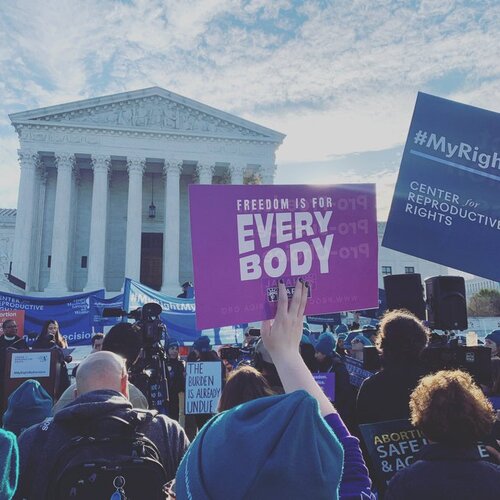
First, the facts:
In 1973, the Supreme Court ruled that the right to an abortion is covered under a constitutional right to privacy in Roe v. Wade. Since then, anti-abortion politicians have levied attacks on that right at every level of government and in the courts. Today, there is less access to abortion than there was in after Roe v. Wade in 1973.
There are two questions regarding abortion rights in this case – the first will be familiar to many folks following the abortion rights debate over the past few decades: June Medical Services LLC et. al v. Russo concerns a Louisiana law that would require all abortion providers in the state to have admitting privileges at hospitals within a 30-mile radius of the abortion clinic they provide care in. This Louisiana law is identical to a Texas law that was struck down in a 2016 Supreme Court Case, Whole Woman’s Health v. Hellerstedt. In that case, the Supreme Court ruled that requiring providers to have hospital admitting privileges placed an undue burden on people in Texas seeking abortions, and was therefore unconstitutional.
Requiring abortion care providers to have hospital admitting privileges is a creative way for anti-abortion advocates to close down abortion clinics, as well as perpetuate the false narrative that abortion is unsafe by linking abortion care to needing to go to a hospital. Abortion is an incredibly safe medical procedure–safer than having a colonoscopy or a tooth extracted–, and licensed medical professionals in every state provide patients safe, high quality health care. Placing arbitrary rules and regulations on providers is not about patients, it’s about creating arbitrary hurdles providers are unable to clear, thus limiting access to abortion care by regulating abortion providers out of existence. Don’t take it from us, take it from the anti-abortion activist who emailed a Louisiana legislator in support of the bill, saying these restrictions had “tremendous success” in shutting down clinics in Texas.
From the Whole Woman’s Health v. Hellerstedt majority opinion:
We conclude that neither of these provisions confers medical benefits sufficient to justify the burdens upon access that each imposes. Each places a substantial obstacle in the path of women seeking a previability abortion, each constitutes an undue burden on abortion access…and each violates the Federal Constitution.
The second question is whether abortion providers can continue to assert third-party standing on behalf of their patients – a practice accepted in abortion-related litigation for 50 years. This would mean that in order to argue that an abortion restriction violates the constitutional right to privacy, a person who was denied an abortion would have to step forward and challenge the law herself–at an extremely vulnerable moment and at great risk to her privacy and well-being–instead of the clinic or provider doing so on the patient’s behalf.
The questions before the court are whether a Louisiana bill requiring abortion clinics to have hospital admitting privileges poses an undue burden on people seeking abortions, and whether abortion providers have the ability to sue on behalf of their patients, also know as “third-party standing” in abortion-related litigation.
KEEP READING FOR OUR LIVE CHAT ON THIS MORNING’S ORAL ARGUMENTS WITH ADVOCACY DIRECTOR ERIN MAYE QUADE AND LEGAL DIRECTOR JESS BRAVERMAN
EMQ: Transcripts are out!
JB: Transcripts are fun!
EMQ: Oh yes they are! Even though I get lost when there’s just a litany of case citations in the middle of a conversation, I really enjoy reading these. But for other people it’s probably a bit….dull?
JB: Probably. So in June v. Russo, a lot of what is so important about the case, and why this is about so much more than just Louisiana, may not be so clear from the transcript. So lucky for our “fans” (aka our respective wives and the people who accidentally clicked on this because it was at the top of their twitter feed), we’ll do more background than transcript here.
EMQ: Great! Let’s get started.
JB: So..
EMQ: WAIT. Before you talk about the case, can you just give me a little bit of background on why this case is so significant? I mean, we were at a rally with Elizabeth Banks and Ayanna freaking Pressley on Wednesday. This hearing is clearly really important.
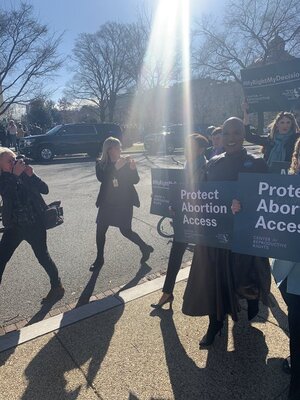
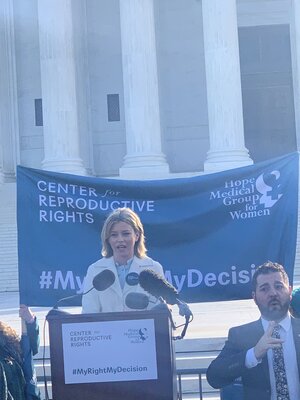
JB: Ayanna freaking Pressley indeed. So to explain it we have to go back to 1973, when the Supreme Court opinion came out in Roe v. Wade. In Roe v. Wade the Supreme Court found that the constitutional right to privacy protects a person’s right to get an abortion. This means that abortion is considered a fundamental right. If a law violates a fundamental (i.e. constitutional) right, the government has to prove the law is “narrowly tailored to achieve a compelling government interest” also known as “strict scrutiny”. Strict scrutiny is a really high bar for the government to meet.
EMQ: That makes sense to me–you want the court to “strictly scrutinize” laws that impact fundamental rights.
JB: Exactly. But in 1992, the U.S. Supreme Court dialed back Roe v. Wade a bit. That case was called Planned Parenthood v. Casey. They didn’t change the fact that abortions are protected by the U.S. constitution, but instead of strict scrutiny, abortion restrictions get a new test – the undue burden test. This means that abortion restrictions are unconstitutional when they have the purpose or effect of placing a substantial obstacle in the path of a woman seeking an abortion.
EMQ: OK, so Roe v. Wade gave us a constitutional right to abortion in 1973, then Planned Parenthood v. Casey chipped away at that right a little in 1992 by saying we have a right to have an abortion, but laws can create burdens to accessing care (just not unduly burden people). And then… what happened in the 2016 case Whole Woman’s Health v. Hellerstedt?
JB: So Whole Wom..
EMQ: Wait! Can I tell you what I know about it first?
JB: Haha sure! I’m very interested to see how your non-lawyer brain explains this
EMQ: So, Texas passed a law in 2014 that required abortion providers to have admitting privileges at hospitals within 30 miles of the clinic. This ended up shutting down more than half of the clinics in Texas. Whole Woman’s Health (one of our UnRestrict Minnesota Community Partners! Woot!) sued the state of Texas saying that law was unconstitutional. The case made it’s way all the way to the Supreme Court, who found that the law provided little or no benefit to patients, while making it extremely difficult for them to access abortion care. Aka it unduly burdened Texas patients and was, therefore, unconstitutional.
JB: That was surprisingly good! And this is why I nominate you to be the Legal Director at every staff meeting.
EMQ: And as I’ve said at every staff meeting, I don’t want your job–you spend 95% of your day wandering around the office waving your hands in the air muttering “serenity now!”
JB: You have a point. Since I’m still the legal director, I’ll just add that what was significant about Whole Woman’s Health is not just that the Supreme Court struck down anti-abortion laws in Texas. It also made it clear that the Undue Burden test is actually a rigorous one. It requires the government to show that the law in question actually furthers a valid state interest, confers benefits that outweighs the burdens, and it is actually based on credible evidence.
EMQ: Is that lawyer-speak for saying that the law has to have more benefits than the burdens people endure? Like a cost-benefit analysis?
JB: Ha, yeah.
EMQ: So THIS case, June Medical Services v. Russo, is the exact same law as the one in Texas, yes?
JB: Yes. Louisiana passed a law that requires abortion care providers in Louisiana to have hospital admitting privileges within 30 miles of the abortion clinic they work in. Meaning they have to have a special relationship with a particular hospital that allows the doctor to admit her patients to that hospital.
EMQ: This is where the advocate in me feels compelled to say: ABORTION IS VERY SAFE. IT IS SAFER THAN HAVING A TOOTH EXTRACTED OR A COLONOSCOPY. And because you’re a lawyer, I’ll also add that the risk of the aforementioned procedures is very low–abortion is just the lowest. People who have abortions are almost never going to hospitals afterwards!
JB: Yes. You’ve made me sit through your training one million times.
EMQ: So, the way I read this, the lawyer for June Medical was just incredibly on point! Distill her arguments for me.
JB: Totally. As the lawyer for June Medical (along with Ginsburg, Sotomayor, and Kagan) made clear:
1) Abortion is so safe that patients rarely have to go hospitals, and if they do they can go regardless of whether their doctor has admitting privileges.
2) On the rarest of occasions when a patient does need care, they are potentially at home already, 300 miles away from the clinic where they had their abortion, and would go to the hospital nearest their house, not within 30 miles of their clinic.
3) Admitting privileges doesn’t serve a credentialing role. In other words, contrary to the state’s claims it is not actually functioning as a quality check on providers. Doctors can’t get hospital admitting privileges for a myriad of reasons. One of the reasons actually has to do with how SAFE abortions are. Because hospitalization is so exceedingly rare, a doctor who just provides abortions wouldn’t be able to admit enough patients in one year to meet the the hospital’s quota. Another issue is that some religious hospitals won’t give privileges to doctors who provide abortion care. None of the refusals to grant privileges in Louisiana have been related in any way to the quality of care that the doctor provides.
EMQ: Yes, yes, and Yes! Ok, so what was Louisiana’s argument then? Because when I’m reading this transcript, what stands out the most is that the lawyer for the State of Louisiana just…doesn’t understand her own case? Can’t come up with anything to support these nonsense laws?
JB: Well what is there to say? She said that the doctors didn’t try hard enough to get admitting privileges at hospitals where it was clear they had no shot in hell of getting admitting privileges. Which RBG swiftly took apart.
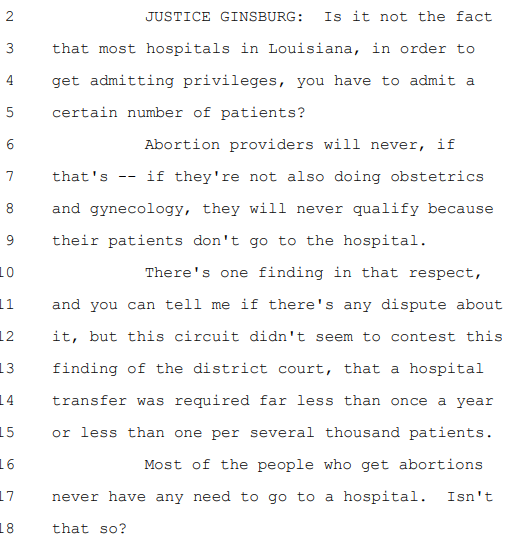
EMQ: RBG! RBG!
JB: The lawyer for Louisiana then tried to make the credentialing argument which Sotomayor took down.
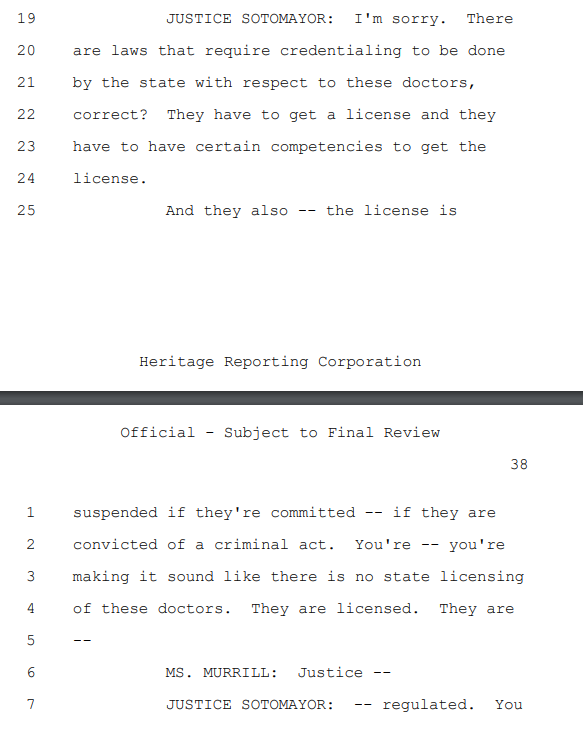
EMQ: And for the credentialing function – essentially, the lawyer for the state is saying that admitting privileges is a way to ensure that doctors who provide abortion care are “good” doctors who provide safe care because they were vetted by a hospital. But even if that were true, that wouldn’t explain why the doctor needs to have admitting privileges within a 30 mile radius of the clinic.
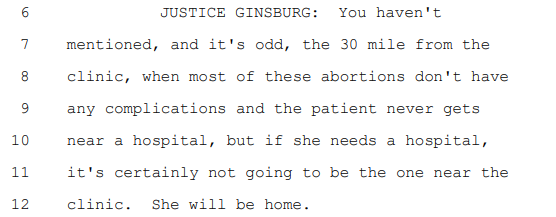
JB: Oh yeah, RBG went to TOWN on the 30 mile radius part of the law.
JB: Now don’t forget, the DOJ was involved in the case too – they asked for permission to come in and support Louisiana’s abortion restrictions. So they got in on the action too. Then the DOJ lawyer came in and basically made the same points as the lawyer for Louisiana and got the same take-downs, with even Roberts jumping in on the action.
EMQ: Wait, what’s the DOJ doing in this?!
JB: The DOJ attorney was the only male attorney to argue. Maybe the DOJ thought the Supreme Court would prefer to hear it from a man? I really don’t know.
EMQ: Well yes, because an argument is only real if a woman says it and a man repeats it.
JB: lololol
EMQ: So um, WHYYYYYY are these regulations back at SCOTUS after they’ve ALREADY BEEN RULED AS UNCONSTITUTIONAL? I guess part of me is reading the irritation from these justices as “uggghhhh we just decided on this”. But they also decided to hear this case. So what’s up?
JB: Well, SCOTUS had to have some reason for wanting to take this case, right? I mean, we need to talk about how absolutely outrageous this all is. Whole Woman’s Health and June v Russo both got to SCOTUS through the Fifth Circuit. And after the Supreme Court JUST found the laws in Whole Woman’s Health in Texas to be unconstitutional, the Fifth Circuit essentially ignored this and upheld identical laws in Louisiana. It’s not like there are wildly different facts in each case, or that there has been some swift cultural change in the last 4 years in relation to these particular laws. So it’s just wild that SCOTUS would agree to hear this case.
EMQ: Right, because the lower courts (ones below SCOUTS and Fifth Circuit) are the ones who do the fact-finding. And then all the courts above that, they hear the appeals. And it’s the higher courts’ job to assess whether the law was correctly applied to the facts that lower court found.
JB: Absent some real error in the lower court, yes the appeals courts tend to accept the lower court’s findings as fair and accurate. Roberts and Kavanaugh suggested that the court may have taken this case to make the point that an anti-abortion law that requires doctors to have admitting privileges in Texas could have a different impact than an anti-abortion law that requires doctors to have admitting privileges in Louisiana–that because a law is an undue burden in one state doesn’t mean it would be an undue burden in another. It’s a point that might sound reasonable at first glance, but it’s not once you really interrogate it and look at it in relationship to the facts of this case.
EMQ: Ok, so did the Fifth Circuit accept the lower court’s facts here?
JB: Nope. Before this case reached the Fifth Circuit, the lower court found that, just like with Texas, there were no real benefits to the admitting privilege law in Louisiana. At the same time, the lower court also found that as a result of this law, Louisiana would be left with ONE clinic and ONE doctor to provide abortion care. The Fifth Circuit decided to disregard those findings.
EMQ: 
JB: Right. And it’s especially troubling for the Supreme Court to try to make the point that the cost benefit analysis of a law may vary state to state in a case where the law in question just has no benefit for patients. Justice Roberts even notes this when he’s questioning the DOJ attorney. He pointedly asks the DOJ attorney whether he would agree that while the impact of the law may vary state by state, the benefit of the law is going to be the same across states. For me that should really end the inquiry though – if the law has no benefit then any impact will outweigh the benefit… and why is the government passing laws with no benefits to begin with if not to create obstacles.
EMQ: I mean…to control our bodies and lives.
JB: 
EMQ: 
JB: The court isn’t only addressing the admitting privileges law, they’re also addressing the question of third-party standing. For, like, 50 years abortion providers and clinics have been able to bring claims on behalf of their patients.
EMQ: Yes, say more about that. I need some lawyer words to explain why the issue of third-party standing is so serious here. Like I understand that it’s bad, but I can’t quite explain it. Or my explanation of it is very…
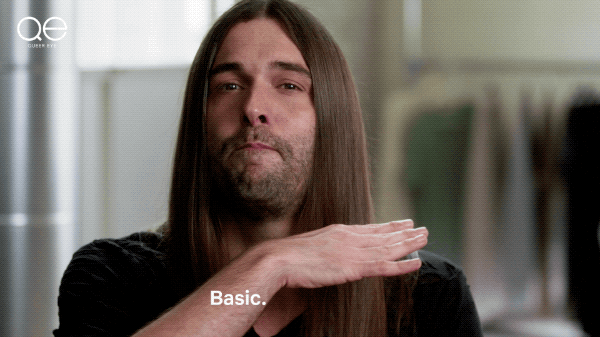
JB: That might be the only basic thing about you. Third-party standing is when someone acts as a plaintiff on behalf of an injured party in a lawsuit. To be granted third-party standing, a plaintiff must have a special relationship with the third party, particularly one that is relevant to the challenged laws, and second they must be able to demonstrate some obstacle to the third party raising its own rights.
JB: Alito jumps in and starts asking a bunch of questions about conflicts of interest in third-party standing scenarios. In other words, assuming there is an actual conflict of interest between say an abortion clinic and an abortion patient, then how can the court allow a clinic bring a claim on behalf of a patient.
EMQ: Yeah I hated reading this whole section. It read like anti-abortion propoganda to me. They’re basically trying to suggest that people who have abortions need to be protected from doctors to provide abortion care. I mean, here is how the state of Louisiana makes the argument about third-party standing – they suggest that laws are needed to “protect women” from abortion providers:

EMQ: So essentially, in abortion litigation, when doctors act on behalf of their patients (like they’ve done in Whole Woman’s Health v. Hellerstedt, Planned Parenthood v. Casey etc), they do so because they obviously have a relationship with their patients, which also relates to the challenged laws, AND the providers are also affected by the regulations that effectively shut down their clinics. But when you say obstacle, what kind of obstacle is the court looking for?
JB: Challenging a law all the way to the Supreme Court is expensive, time consuming, and can have a lot of repercussions for plaintiffs because they are so high profile. That’s why groups like WWH and June Medical Services act as plaintiffs. Though let’s be honest, it’s time-consuming, stressful, and expensive for the clinics, too. Thank you plaintiff clinics!
EMQ: YES! Thank you to them! Okay, so I get it. If abortion providers lose third-party standing, doctors would no longer be able to sue on behalf of their patients.
JB: Right. If SCOTUS rules that providers no longer have the right to sue on behalf of their patients, it would be more difficult to bring lawsuits challenging abortion restrictions. And I’m not sure if you’ve noticed, but there are a LOT of abortion restrictions being passed right now.
EMQ: Yeahhh…because without the doctors, it would have to be a pregnant person who sues and that pregnant person would have to be willing to go through super stressful litigation, AND they’d have to go through it knowing that even if they won their case, they wouldn’t even be able access abortion care.
JB: Exactly. Pregnancy is rather time sensitive and courts don’t move that fast.
EMQ: So really this is just another way of trying to weaken Roe v. Wade without even having to strike it down. Jokes aside, how do we sum this all up?
JB: Well, in good news the court seemed skeptical of Louisiana’s attempts to justify these laws, which is not a guarantee of a good outcome here. SCOTUS had to have some reason for wanting to take this case. It also didn’t seem like the court wanted to do away with the concept of third-party standing, but they might plan on making it more difficult for providers to bring claims on behalf of their patients.
EMQ: So is it fair to say, even after oral argument, we can’t really predict what the court intends to do here?
JB: Fair and accurate.
EMQ: Something I’m called ALL the time. Let’s end on some good news for our Doe v. Minnesota case. Minnesota doesn’t have to follow federal law on abortion right? Because the MN Supreme Court has said “…we have interpreted the Minnesota Constitution to afford broader protection than the United States Constitution of a woman’s fundamental right to reach a private decision on whether to obtain an abortion…”
JB: Correct.
EMQ: And the Minnesota courts use strict scrutiny when patients, or others acting on behalf of patients, challenge abortion restrictions.
JB: Also correct.
EMQ: So even if the court uses the June case to weaken the federal constitutional protections, this doesn’t change what happens in Minnesota law, right?
JB: Right again.
EMQ: And Minnesota Courts don’t have to follow federal courts on the question of Third-Party Standing right?
JB: Yup – you know all the answers, you aren’t really asking me, right?
EMQ: Hahah pretty much. Doe v. Minnesota will still go forward regardless of what happens in June Medical Services. When you come to Minnesota Courts under Minnesota laws you get Minnesota Justice.
JB: That’s right.
EMQ: So we’ll end where we usually end: me being right.

WE MADE IT! THANKS FOR STICKING WITH US WHILE WE UNPACKED THE JUNE V. GEE ORAL ARGUMENTS. STAY TUNED FOR MORE NEWS AND UPDATES ON THE NEW SUPREME COURT SESSION.